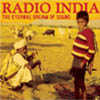 Edited down from hours of raw tapes of radio broadcasts recorded from 1989 to 1996 from New Dehli to Bengal to Calcutta and every point between, Radio India is the newest addition to Sublime Frequencies' growing library of ethnic radio collage. It's a massive two-disc set of low-fidelity radio transmissions that encompass Indian classical ragas, Bollywood pop music, psychedelic rock, lush orchestrals, folk music, electronic dance music and a variety of Indian divas. The patter of on-air DJs, commercials and radio dramas have all been left intact, along with a generous helping of hiss, distortion, sound dropouts and vinyl pops and skips.
Edited down from hours of raw tapes of radio broadcasts recorded from 1989 to 1996 from New Dehli to Bengal to Calcutta and every point between, Radio India is the newest addition to Sublime Frequencies' growing library of ethnic radio collage. It's a massive two-disc set of low-fidelity radio transmissions that encompass Indian classical ragas, Bollywood pop music, psychedelic rock, lush orchestrals, folk music, electronic dance music and a variety of Indian divas. The patter of on-air DJs, commercials and radio dramas have all been left intact, along with a generous helping of hiss, distortion, sound dropouts and vinyl pops and skips.
 
This compilation immediately distinguishes itself from the endless parade of Nonesuch Explorer and Smithsonian Ethnic Folkways collections of Indian music by capturing Indian music as Indian people hear it — unmediated by Western anthropologists and archivists. This isn't a collection comprised of rehearsed, self-conscious musicians performing the music of their traditional heritage in a studio at the behest of Western producers who may or may not be paying them. Rather, because of the de-emphasis on "tradition" and "heritage," much of the music on Radio India is a delightful cultural crossbreed — combining traditional Indian instrumentation with newer studio techniques and effects, freely borrowing from Western pop music, Broadway songs, European classical and baroque styles and Arabic orchestral traditions. It's a jumbled mass of sounds and influences that forms a tangible continuum of sound, the Eternal Dream of the album's subtitle. Hypnotic bedrocks of rhythmic tabla form a backdrop for dramatic swoops and curls of viola and chenai. Though it has certainly been observed before, I never fail to be amazed by the intrinsically psychedelic nature of Indian music; the expressive, reverberating character of instruments such as the sitar and sarongi, the effortless and natural swarms of incense-billowing sound. It's a tradition defined by trance and transcendentalism, by improvisation and de-intellectualization, by drones and repetition. Indian spirituality is defined by limitless concepts like Krishna and Kali, rather than the restrictive paternalistic concepts of Western spirituality. Indian music's structure is defined by open-ended, improvisatory interplay between musicians, rather than the rigid, virtuosic displays of Western musicians. It is precisely these differences that make this music so intoxicating to our ears, and Radio India allowed me to live inside this vast museum of sound for over two hours. 
Read More

